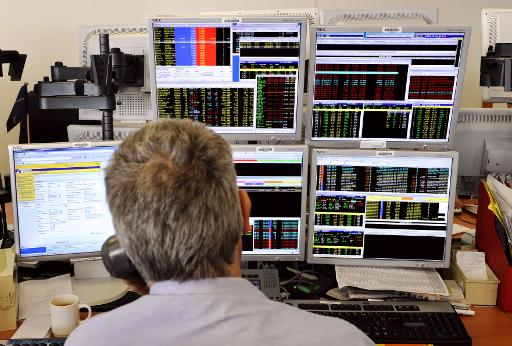European stock markets slid further on Tuesday following heavy losses across Asia, as oil prices struck fresh five-year lows before recovering slightly.
The euro rallied against the dollar a day after the European single currency hit a two-year trough against the US currency.
While oil companies are feeling the pressure of sliding crude prices, the biggest share price fall in London on Tuesday was supermarket giant Tesco after Britain’s biggest retailer unveiled a fresh profits-warning.
In early afternoon deals, London’s benchmark FTSE 100 index stood at 6,593.51 points, down 1.18 percent compared with Monday’s close.
Frankfurt’s DAX 30 lost 0.92 percent to 9,922.85 points and the CAC 40 in Paris slumped 1.31 percent to 4,317.96.
Shanghai shares plunged more than five percent Tuesday on profit-taking, a day after the benchmark composite index broke the 3,000 mark for the first time in more than three years.
Across Asia, equity markets retreated after a healthy run-up over the past week, while energy firms took a hiding as oil prices hit fresh five-year low points.
– Oil heads south –
After hitting its new trough at $65.29 a barrel Tuesday, Brent North Sea crude for delivery in January recovered to $66.71, up 52 cents from Monday’s close.
US benchmark West Texas Intermediate (WTI) for January also hit the lowest level since 2009, reaching $62.25 a barrel. It later stood at $63.67, up 62 cents.
Crude prices have plunged by more than 40 percent from their 2014 peaks in June owing to slowing growth in China and emerging-market economies, a recession in Japan and a near-stall in the eurozone.
On top of that, the OPEC oil cartel last month said it would maintain output levels despite ample global supplies.
A stronger greenback has also weighed, making dollar-priced oil more expensive for buyers using weaker currencies, denting demand.
On the London Bullion Market, gold jumped to $1,206.50 an ounce from $1,193 on Monday.
In foreign exchange on Tuesday, the euro was at $1.2361, up from $1.2308 late in New York on Monday. The European single currency had kicked off the week with a two-year low of $1.2247, weighed down by strong US jobs data and weakness in the eurozone economy.
– Russian economy –
Elsewhere Tuesday, Russia’s central bank said it had spent $4.5 billion (3.6 billion euros) last week to prop up the ruble, which has plunged over falling oil prices.
The Russian currency lost almost a quarter of its value in November, and the trend has continued in December, with the ruble dragged down by the falling oil price and the ongoing Ukraine crisis.
Russia is heavily dependent on its energy revenues, which contribute to half of its annual output.
The World Bank on Tuesday predicted that Russia’s economy would shrink by 0.7 percent in 2015, but warned that the contraction would be worse if oil prices were to keep sliding.
On the corporate front, Tesco shares were down 9.65 percent at 169.24 pence in afternoon deals, making it the biggest faller on London’s FTSE 100.
The world’s third biggest supermarket group said its trading profit “will not exceed £1.4 billion” ($2.2 billion, 1.8 billion euros) in its financial year to February 2015. Analysts’ consensus had been for £1.94 billion as Tesco undergoes changes to its business triggered by a fraud probe.

COMMENTS
Please let us know if you're having issues with commenting.